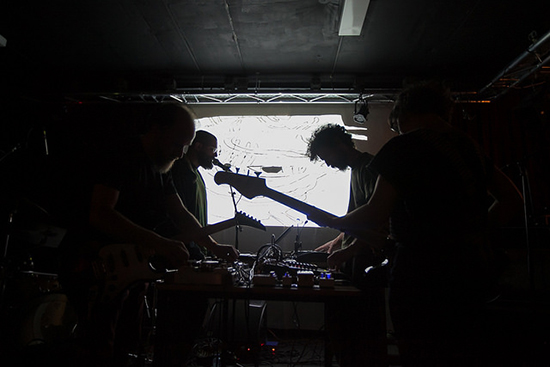Photograph courtesy of Jan Rijk
Wednesday
Nadja and Uochi Toki, above
It has to be said that rapper and live cartoonist is a pretty unique combination in my experience of gig going. Matteo ‘Napo’ Palma is no Killer Mike, and come to think of it he’s no Savage Pencil either, but there’s something engrossing about watching him scribbling away on the touch pad of his iBook, sometimes applying digital effects to what he’s drawn, occasionally spitting verse in Italian. The screen behind him only shows detail of a much bigger picture that he’s working on – is it some kind of demonic futurescape? What at first appears to be sub-Shaky Kane and Joan Miro scribbles do suggest something of much deeper complexity as the show continues. However there isn’t enough context to tell for sure.
Napo is part of the Italian hip hop duo Uochi Toki who are tonight performing with Nadja, who are on glorious form (as is the other Italian musician working on electronics, Riccardo ‘Rico’ Gamondi). With good reason the combination of heavy metal and hip hop is treated in most circles with the kind of caution reserved for unexploded bombs. But, then, this is neither simply heavy metal or hip hop. Aiden Baker and Leah Buckareff coax lysergic washes of reverberant guitar tone while Uochi Toki provide electronics and crunchy beats which combine somewhere between New Kingdom, Spacemen 3 and Die Form. Whatever impact Baker sometimes loses on record due to his bewilderingly prolific output he can still totally bring it live and tonight is only the second of 58 times he’s playing during this festival. Shout out to the beats on their final track which make The Chemical Brothers sampling ‘When The Levee Breaks’ sound like a particularly stripped back Ricardo Villalobos track comprised entirely of samples of ants walking across cottonwool. For all I know that massive whopping kick is probably still echoing round the streets of Tilburg as I write this several days later. John Doran
Dodecahedron
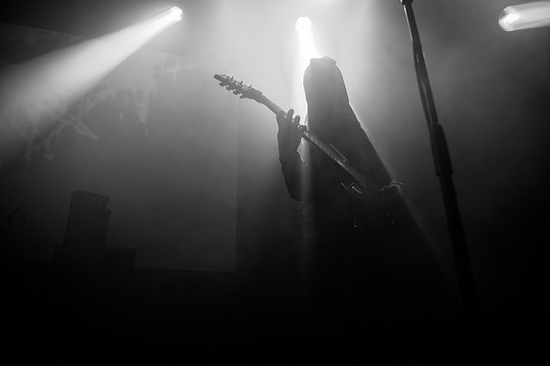
Photograph courtesy of William van der Voort
Replete in Satanic snoods Dodecahedron are fucking great. Without abandoning one iota of tar black misanthropik metal ov bl(e)akest ever bl(e)ak they are so much more than mere second wave battle recreationists. Relying on a bedrock of churning psychedelic bm riffs with some classic twin guitar assault flourishes they deploy a heavily processed swooping lead that sounds like a time stretched air raid siren which warns of the inevitable approach of some unimaginably terrible aircraft. John Doran
Ggu:ll
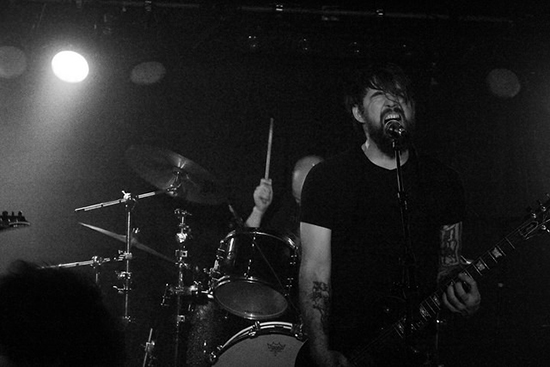
Photograph courtesy of Luuk van Son
Crowning a searing night of metal on Wednesday, following Dodecahedron as well as Krallice, were doom four-piece Ggu:ll, playing a hometown set. Crammed down the front of Extase, the band set down glacial-pace riffs unrelenting in seismic, quaking bleakness, occasionally strafed by some colossal tom rolls from drummer BW, monikered in the band’s favoured initials. Frontman W(illiam) v(an) d(er) V(oort)’s vocals switch between a scoured-throat howl and full primal roar, which forms a pleasingly bracing counterpoint to his photos of moments of the everyday in Sevilla (a man midway through pulling his jumper on; a balloon vendor weighted down by an overgrowth of Mickey Mice), being exhibited in Fahrenheit over the course of the festival. For music that’s essentially precision-tooled to sap souls of joy (had the faders on the sound desk been raised a couple of notches, it could have been full annihilation), it’s hard to deny it’s anything other than immensely satisfying. Laurie Tuffrey
Deathcrush
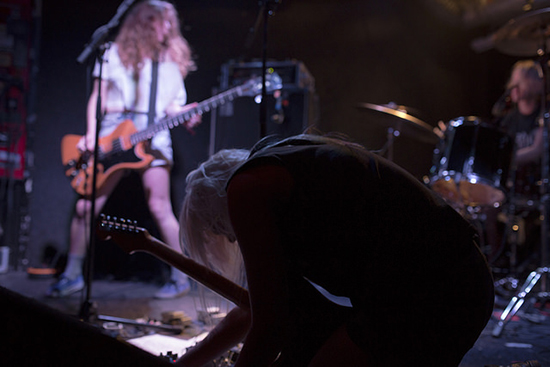
Photograph courtesy of Thomas Quack
Deathcrush are one of the best bands I’ve seen at Little Devil in the decade I’ve been coming to this redoubtable metal bar in Tilburg… and I’ve seen some damn fine bands here. Some credit needs to go to the sound guy who seems to be operating above and beyond the normal rock venue everything louder than everything else credo and has created a dynamic mix for the Oslo power trio. However kudos to the Crush team whose always massively impactful noise rock is now married to a road hardened spin on a dime tightness. Relatively new addition to the set a cover of The Bangles’ ‘Eternal Flame’ is particularly banging as if delivered by Killdozer playing with Babes In Toyland. And the newly revamped murder grind of ‘Lesson #16 For Beatmaster V’/’Fun’ … all ‘Expressway To Yr Skull’ and ‘Song Of The Minerals’. A triumph. And by that I mean the make of English sports car. Running over your fucking head. Squeezing your brains out of your ears like toothpaste. John Doran
Thursday
Holly Herndon

Photograph courtesy of Ed Jansen
With rumour of Facebook profiles being probed and audience members’ phones being called from the stage during performances by the San Francisco composer, it’s with intrigue that we view the open TextEdit document being projected onto the two screens as we enter 013’s main room. Herndon and collaborator Mat Dryhurst arrive and the page gets some words. "It looks like you each have your own row to occupy," types Dryhurst (though in fairness, those rows soon fill out). Digital distortion sweeps across the speakers. "It needs to be way louder," comments Dryhurst. There’s no discernible change. "Is that loud enough?" he asks, shortly following up with another astute observation: "The public say nay!" As tQ editor John Doran said earlier in the day during an onstage interview with Herndon, her performances have given the lie to the notion that laptop music is unengaging; this may only be the preface to the main event, but we’re immediately hooked in by this disembodied version of between-song chat.
The music is now thankfully at a volume closer to crushing, and something that starts out at Herndon’s voice filters through. Dryhurst gets on Facebook and busies himself picking through the profiles of people attending the "Incubate Thursday" page. Those that seem to be deemed interesting enough get opened up in a new tab, before Dryhurst goes About > Family and Relationships. Today’s attendees don’t seem very sharing in that department, so it’s off to the profile pictures. A holiday snap of camels walking in the desert doesn’t cut the mustard, but one of a user blazing on a guitar does and promptly goes to Dryhurst’s desktop. It’s not mean-spirited or invasive – Dryhurst congratulates Jeffrey Zweep on his new job – just curiously mesmerising to watch.
Sonically, though, things have now shifted to a dulled, grime-flecked bassy throb, overlaid with snatches of Herndon’s manipulated, morphed voice, kickstarting a visual change. We’re inside a 3D shot of someone’s kitchen, one that’s gradually being populated by 2D pigeons. The birds begin to leave trails of themselves and soon the screens are a writhing mass of, well, pigeons. With the unflinching severity of a digital pest-controller, they’re rapidly dispensed with and replaced by slowly descending Japanese household objects, much like those that appear in Herndon’s ‘Chorus’ video. Miffy mugs, toothpaste tubes, pizza boxes all fall from the sky, a seemingly strange hyper-objectification of objects. Though this, in fact, may be why they’re the perfect choice. Herndon’s music feels like one of defamiliarisation – with the human nature of the voice, with dance music, with the dull matter we surround ourselves with, all transmuted, picked apart or reframed. A photograph of a man captured midway through washing up gets examined from all angles, while later Dryhurst travels into the innards of the objects hanging in a room, making the most mundane of substances – genuinely, brown card – uncanny.
Beneath these ideas, though, you’d think the music could be ruined by overthought. This couldn’t be further from the truth: the staccato voices and metallic ping-pong rhythms of ‘Chorus’ hove into earshot. The track’s a frenetic piece of glitchy rhythm and clipped vocal sample, coalescing in moments into luminescent pop, with a fondness for techno bangers lying somewhere in its composition.
At the close, it’s hard to feel anything other than that was one of the most exciting performances I’ve seen in ages. It looks like Herndon’s on the verge of any number of releases, which should hopefully mean more gigs will be imminent. Go and watch her if you can – it’s strange, funny, thoughtful and, ultimately, brilliant. Laurie Tuffrey
Gazelle Twin
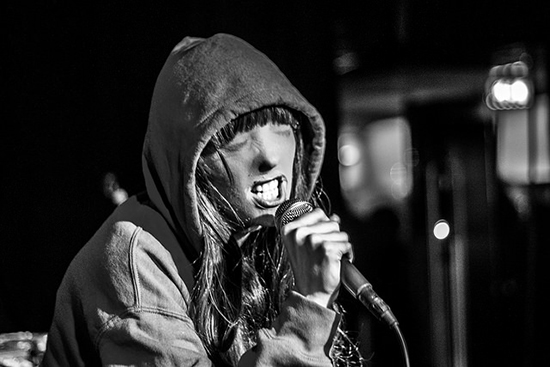
Photograph courtesy of Ludovic Sirtaine
After the joyous Stellar OM Source gig in the Small Hall we head back to the foyer of the 013 building for another ratcheting up of the pressure. Gazelle Twin. Up until now, things had been cooler, spacious and that bit more refined. With Gazelle Twin a different vibe starts to make its presence felt. For one, the temperature rises to the same level as in the two main halls. Things get sweaty, and a wee bit unconfortable as the steadily growing crowd started to inch forward, curious to see what was drawing them in, getting sucked into the increasingly powerful forcefield the Twin were throwing out.
Gazelle Twin know how to make themselves noticed. Which (when presented with the actual, physical evidence of Gazelle Twin) can initially seem weird. If you’d just been passing by, and caught a bit of the gig from the back of the foyer, you’d have wondered what the fuss was about. From a distance, Gazelle Twin look like nothing special. A duo wearing red and blue hoodies, the red one, Jez, is behind the table holding the electronic impedimentia, the blue one, Elizabeth, is singing and dancing in front of it. Nothing new about all that.
But what Gazelle Twin do supremely well is, through a whole heap and jumble of suggestions, declamations and posturings, make you question yourself. They make you uneasy. It’s not totally clear what they’re asking you to do, but it’s to do with your own place in the scheme of things and how comfortable you are in your own skin; anxiety made flesh. And without this questioning element what Gazelle Twin do would be a set of noises and shapeless passages of sound. They take real care to embody these grey areas in their act. On closer inspection certainties began to crumble as you start to notice a number of disconcerting details about them. Was that a wig or does Elizabeth, the singer, have the most luxurious hair ever? Why did she have a nylon stocking over her head? Shit, if you look carefully, you notice that the folds of this stocking have started to congregate round her neck; making her look as though she’s melted. She has the sort of anonimity that also highlights queasy, uncomfortable details about the passage of time. There’s this aura of the stage about them, like they are a Jacobean revenge play, with Cyril Tournier twiddling those knobs and wires.
Musically, there’s something of a D.A.F. element about it all; maybe D.A.F. toying with the idea of making a grim hip hop record. It’s mostly in the way Elizabeth moves and breathes. She dips and sways in the way Gabi Delgado did; at one moment provocative, at one moment declaiming, the next drawling, legs akimbo, throwing her weight from one leg to the other in that same manic way as Delgado. Her vocals have the same way of suggesting the worst possible things in a really appealing manner. And it’s hard not to fall for it. Richard James Foster
Carter Tutti Void
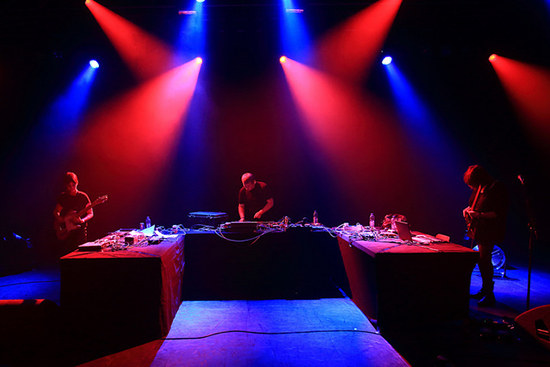
Photograph courtesy of Thomas Quack
The things that immediately hit you – genuinely, point blank, right in the chest – are Chris Carter’s drums. Transverse does as good a job as a recording can of conveying the sheer, physical strength of Carter Tutti Void’s music, but nothing could really match the quaking power they achieve other than seeing them live. I’d imagine it’s a familiar sensation to those who’ve borne witness to Throbbing Gristle or Carter Tutti, but Carter, standing centre of stage flanked by Nik Colk Void and Cosey Fanni Tutti, seems to have formulated some means of isolating your stomach and vibrating it to its core with his kick drums. They start off heavy, but he soon plumbs lower, unimaginably lower, until 013, a new-build, solid chunk of concrete and metal venue, seems to quiver on its foundations. It’s a force that stretches to the projections of their album cover on the screens either side of the stage: the incremental speed with which the central, chequered circle rotates suggests it’s somehow these behemothic drums that are pushing the grindstone.
Across these, Void and Tutti strafe the air with fragmentary noise. There are metallic clangs and string buzzes, rattled with delay, traceable to the wood and metal instruments, but other sounds spiral and transform, ephemera gone as soon as formed. Void holds drumsticks over her pickups and bows the guitar, which at first resembles an adhān fed through a distant tannoy but this escalates into the violent scything of a buzz saw. It’s almost harder to trace Tutti’s contributions, but you sense they’re the sounds that grow to surround, that of glass breaking, digital bits dripping. And, all the while the guitars’ output collides, Carter pulls out another fucking unholy kick drum.
The best of it is the combination: there’s the jubilation and uplift that comes with techno, the reason that people are moving down at the front, faces cast in elation, and there’s the fascination and the oddity of the sounds Void and Tutti pull out of their instruments, the flares that ascend to the rafters. It batters you, time and again, and you can’t help but be thankful. At the end, a man in a Coil T-shirt just stands and screams at the now-empty stage for ten solid minutes, and in no way does it feel anything but a fitting response. Laurie Tuffrey
Cairo Liberation Front
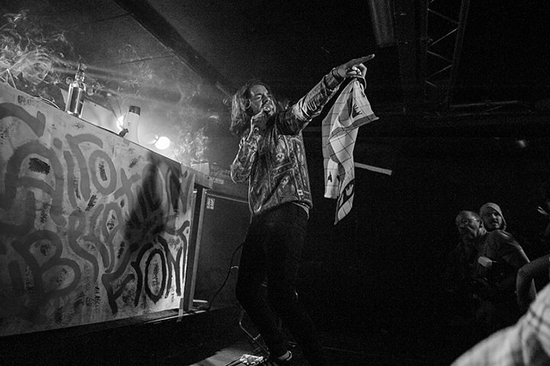
Photograph courtesy of William van der Voort
As we enter the back room of Extase, an unsettling sense of calm filters through the space between the stage and the bar. People are milling about, sipping politely on drinks. An abandoned air raid siren sits on the floor at the front; a lone bottle of vodka stands ominously on the table set up, seemingly the only needed instrument for the performance ahead. It’s a crank of the former that signals the beginning of Dutch DJ duo Cairo Liberation Front’s chaotic set, deliberately churned out before Yannick Verhoeven’s right finger stabs down onto his handheld MIDI controller and the room erupts into a set of wall-to-wall auto-tuned Electro Chaabi anthems, brought from the Egyptian underground and into Europe via various tunneled channels of the internet. What follows is an abundance of fun: drinks are gleefully lost, arms and legs fly in every direction and the Quietus’ Laurie Tuffrey surges to the front of the crowd to receive a stream of vodka shot directly into his open mouth by a water pistol. The main instrument. Sophie Coletta
Saturday
Skullflower
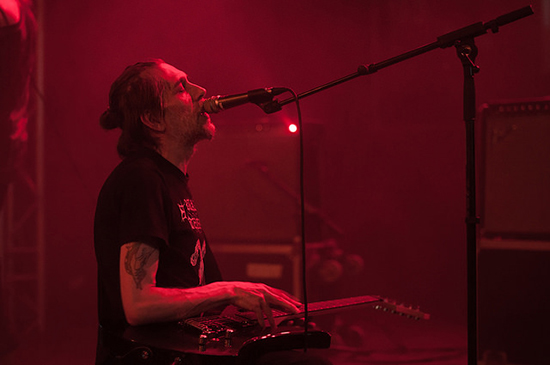
Photograph courtesy of George Knegtel
Skullflower have a special smoke machine which Matthew Bower spends ages fiddling with as Samantha Davies bows up a dignified but feeding back violin tone. Into the device he drops mud from the slough of despond; mouldering branches from a damp forest untouched by mortals for 200 years; past its sell by date church incense; legal high shop analogue heroin; Bantha dung; splinters from the one true cross; pages torn from a tear stained copy of Psychopathia Sexualis and the tattered inserts from old Ramleh tapes. It’s not an oppressively foul smell but it is umami… the adult flavour, the intense tang of grown up pastimes which are definitely acquired tastes. Wolves on a projection screen unleash lupine carnage in a bar and a restaurant as the duo summon up an ever growing throb of feedback, strings, mechanical white noise and raga like incantation. It is blissful and a pleasure completely acquired and submitted to, although you get the distinct impression that not everyone in attendance feels the same way. John Doran
Tusmørke
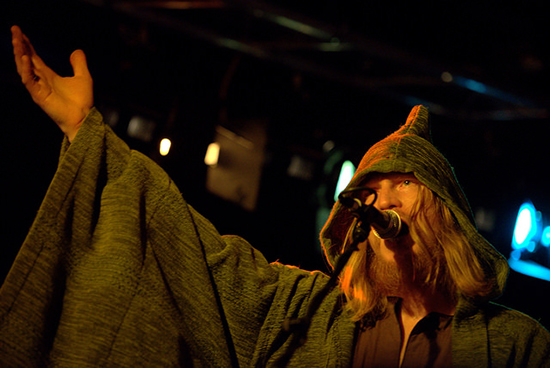
Photograph courtesy of Hans van Wijk
Tusmørke; a Norwegian ensemble (who on this evidence) are dead fond of face paints, flutes, pointy hats and robes. Looking like members of the council to the court of Harthacnut has many, many advantages in this correspondent’s eyes; and we should always be thankful that the punk wars never really killed off rock’s inner Wakeman. We should also revel in the memory of Tusmørke’s brain-frying banter, which older readers may be horrified to hear has something of Trev and Simon about it. Dedications to four specific plants in Oslo’s Botanical Gardens, and a warning that studying the Natural Sciences was downright evil are real highlights and something I will always treasure. Musically the whole thing splutters along pleasantly (or frustratingly) in third gear. Meandering bass lines, spaced out sounds from the keyboard player (who older readers may be horrified to hear was the spit of Welsh snooker ace, Willie Thorne) and flute runs played tribute to those musty mind-maps set out by Gong and Jethro Tull. Fair enough. We got increasingly sucked into this; the way you get obsessed by listening to old Rubble LPs. The last track is a mystifying, formless mess, but somehow that was fine too. We dug! honest! Richard James Foster
eMMplekz

Photograph courtesy of William van der Voort
The first thing you notice about De NWE Vorst is that its doors sound uncannily like those sliding squeaks on Throbbing Gristle’s ‘Persuasion’. Inside, the audience for this evening’s performance, a collaboration between Nick Edwards’ Ekoplekz and Ian ‘Baron Mordant’ Hicks of Mordant Music, half-stand, half-sit across the wooden floor. Over the course of the performance that follows they drop to the ground, splaying out on their chests and backs, removing shoes as heads loll back and eyes close. On the screen behind, CCTV shots of corridors and VHS time stamped 90s landscapes flit across a projection screen: rave scenes, police accosting a young boy in a tracksuit, rolling pans across English moors.
Hicks pulls up a stool to the corner of the hardware cluttered table, clutching a stack of A4 paper that he reads from beneath a lamp. He begins speaking into a heavily delayed microphone, uttering singular words that play out with thick reverb over the top of Edwards’ steadily mutating sequences. At first, it’s hard to establish what language he’s speaking in, a few moments in you begin to distinguish them as names: Yul Brynner, Jimmy Saville, Bruce Forsyth, Pavarotti, Jeremy Irons, Ronnie Corbett, Christopher Lee. Hicks uses his voice as much as an instrument as an implement of meaning, and these names gradually unfurl with the sounds that surround them into fragments, and then sentences you can only snatch at bits of: "eyes like pissholes in the snow", "came out on EMI classics", something about a post office in Hastings. It all feels undeniably English; the imagery, Edwards’ polite yet disturbing modulations, Hick’s spoken word accompaniments tracing lines between the skeletal language of Sarah Kane, to the nonsensical humour of Lewis Carroll, to Romanticism, to the free indirect speech of Virginia Woolf and her Modernist acquaintances. He meanders then falls quiet, and Edwards continues squeezing terse oscillations out of his hardware for a few minutes, before slamming his fist down onto his controls to administer the most cruelest of silences. Sophie Coletta
Bardo Pond
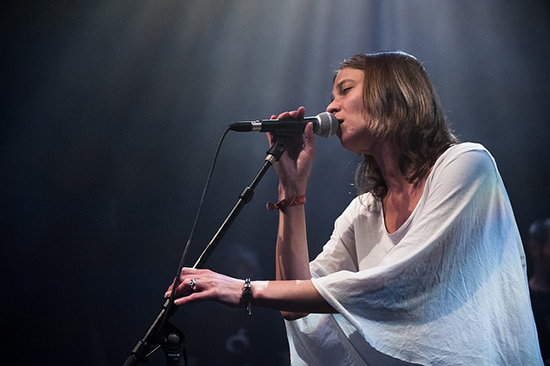
Photograph courtesy of William van der Voort
What better way to vaporise David Tibet’s hemp-hued village fête frolicking from aural memory than by the righteous guitar grind of Bardo Pond? None, is the answer. The band churn out ten-minute stretches of repetition, soaked in distortion, the chords of ‘Before The Moon’ hammering down through the stage. Isobel Sollenberger’s flute shades the music with a mystic quality, as do the video projections, engrossing and at times vaguely unsettling scenes of a family running first through a Pacific Northwest forest then dragging themselves through a field, helping to render De NWE Worst’s main room a spectral otherworld. Laurie Tuffrey
Innercity Ensemble

Photograph courtesy of Alexey Ferapontov
Pushing Paradox’s relatively diminutive stage space to the maximum, the seven-piece free-form ensemble from Poland set about forging one of their cosmos-gazing crescendos. Ringing cymbal rolls and gong chimes open, soon joined by the scuttle of laptop noise and a plane of guitar sweeps beneath sporadic bursts of energy from the trumpeter; a sonorous wave that builds and builds gloriously, achieving a similar, if less sinister, sense of gravitational pull as Swans’ extended pieces. Elsewhere there are rhythms, through which guitarist Artur Maćkowiak meanders a circuitous, deft improvisation and, as my colleague points out, there’s a fine use of the silver-trimmed alpine horn from Rafał Kołacki. It’s those slow fabrications of burgeoning sound, though, at once both heavy and fleet-footed, that leave us reeling at the show’s end, minds well shifted from their moorings. Laurie Tuffrey
Low Jack
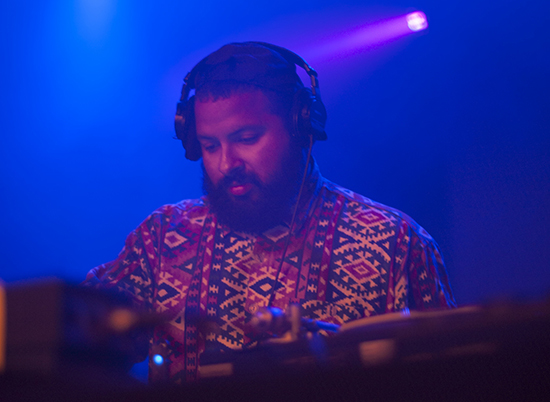
Photograph courtesy of Eline Benjaminsen
Low Jack’s Saturday DJ night set comes by recommendation of Karen Gwyer, who gave the L.I.E.S affiliated producer a firm thumbs up in a recently conducted Quietus interview. He plays over at Dudok where, whilst there’s a scattered crowd, as there seems to be for many of this week’s more dance-orientated performances, spirits are high and there’s plenty of room for our ever-flailing techno slog to become a more facilitated exploration of space. Read: More ridiculous dancing. It’s a much needed brief dosage of pummeling techno, and better still, midway through he drops Nitzer Ebb’s ‘Join The Chant’ and the room breaks out into further loose-limbed frenzy. One fist raised, we fire off capitalised texts to the Quietus’ Luke Turner, currently doing a Douglas J. McCarthy Q&A in Glasgow. "MUSCLE AND HATE". Sophie Coletta
Sunday
Container
We arrive for Ren Schofield’s highly anticipated Container set on Sunday afternoon accompanied by a large 3 litre box of white wine and the residual remains of the night before still dancing between our ears. De DWE Vorst is a strange venue; its towers of speaker stacks loom with seeming potential; but never seem to reward in decibels over the course of the week. It’s even more impressive, then, than Schofield manages to hammer out a powerfully unforgiving 25 minute blinder of a set, simultaneously achieving sonic itchiness, claustrophobia and gargantuan presence, all without the aid of colossal volume to hand. His background in noise music perforates the performance; the briefness of the set, the feedback that flares up again and again, whistling across the speakers before the kicks of hyperactive toms and creepy scuttles of vocals wheedle out from the cracks of frazzling snares. And then it’s all over, and much too quickly. Sophie Coletta
Stara Rzeka

Photograph courtesy of George Knegtel
Relocated from last night’s performance with Innercity Ensemble, Kuba Ziołek is sat in front of the altar of Tilburg’s tiny Pauluskerk, cast in the sapped yellow of late afternoon. Fingerpicked notes fall out of Ziołek’s guitar, looped over into a metallic gauze, to which he gradually adds his vocals, which are redolent of Grouper’s Liz Harris: partially-voiced palimpsests of words coalescing to form harmonising textures. The loop builds and begins to nod towards Ziołek’s heavier output, a roaring groan of sound powering benignly from behind the altar. What’s left is a pleasing mismatch between what you can see, minor adjustments to a bank of pedals on a desk, and what you can hear, a singularly beautiful veil of sound. Laurie Tuffrey
Baaba
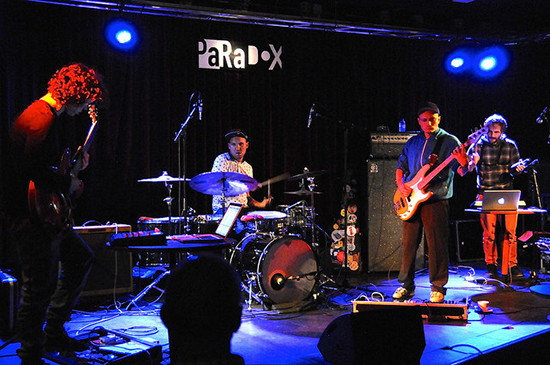
Photograph courtesy of Vera Cerutti
Throughout the week, Paradox busied itself in hosting all sorts of tripped out sounds from Poland to celebrate the Polska na Incubate showcase, and we are lucky enough to catch a number of really fine acts such as Stara Rzeka, Innercity Ensemble, Hokei and Baaba. Now, Polish artists have had a very long pedigree in carving out their own independent cultural space in the face of all sorts of "political issues" over the years (Orange Alternative, Jerzy Kalina, Kult, Dezerter, to name but a tiny handful). Consequently there is a tradition of self-reliance and playful, sometimes bullish determination about the Polish arts canon that can be drawn on to override any irrelevant fripperies or inconsequential fussing.
In Paradox on the Sunday we get another demonstration of how these Polish Heads just get down with Baaba; an act that’s garnered a fair amount of international critical acclaim for their steaming brew of electronic-jazz fusion and whacked-out psychedelia. Not that you’d know it, as Baaba are four gents who – on this evidence at least – pull off the trick of being strangely anonymous whilst rocking a remarkable mix of street urchin/sacked geography teacher/allotment freak attire. I’m really not trying to have a crack about their dress sense here. Rather, I want to make a point that Baaba radiate this collective sang froid that (given their look) immediately suggested that they could do, say and play pretty much anything; and don’t need any old stage props or greasepaint to make their point. And they do. They are, in short, fucking incredible; throwing a whole host of loose shapes that bounce between a bedsit take on Moebius and Plank, a baggy work out of Holger Czukay’s Rome Remains Rome, and the burn-outs offered by fusion pranksters such as Snorkel and Perfect Vacuum.
Baaba’s "anything goes" looseness is obviously hard-earned and well practised, and they certainly revelled in taking the jolly old Henry Cow key change routine to new levels of absurdity. Mindblowing. Richard James Foster

